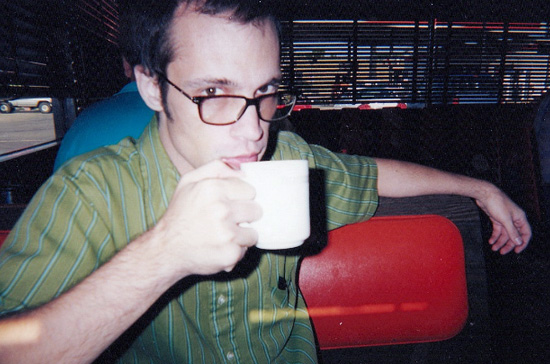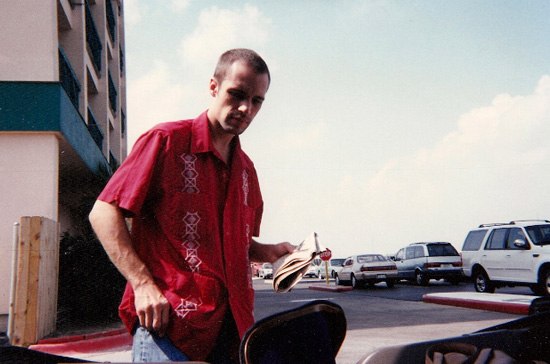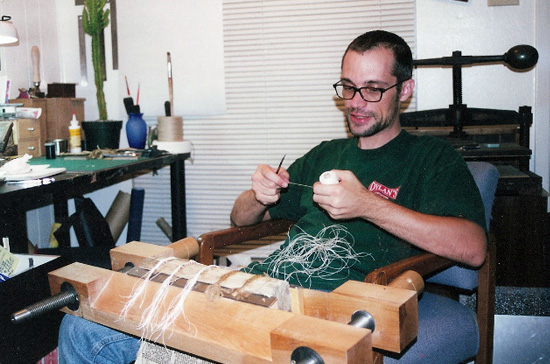Vanilla Themes


 Words: Kat Hartmann Images: Bill Cotter
Words: Kat Hartmann Images: Bill Cotter
Spent any time making the news lately? You might find an appropriation of yourself in Bill Cotter’s debut novel, Fever Chart. Cotter is fond of basing his characters on people he sees in the news. You may not recognise yourself though; he tweaks said characters just enough to make them his own.
After completing his debut novel, Fever Chart. Bill Cotter became something of an enigma to me. The online medium divulged nothing of his secrets. It housed little more than a few hundred of his written words. The sum total of this man was – unbelievably, in the cyber age where anonymity has become so very 2005 – no more than a few hundred tangible pages of impressively written words (read: a book). Until, that is, opportunity arose.
Before speaking to Cotter for the first time I struggled to rationalise the mental image of a man who, it had been hinted to me, was intimidated by much of the world beyond his own front door in the garishly oversized Central American state of Texas. As if to add to my mental-picture disparity, I discovered Cotter converses sans twang and owns no guns to speak of – despite the fact that no state licence is required to possess a rifle, shotgun or handgun in Texas. Guns to Texans are what dogs are to Vancouverins – everyone has at least one.
I had the impression that Cotter is not a man that would sit happily with the confines of any one stereotype. Fever Chart is certainly not your average debut literary offering. The book deals with mental illness, institutions, homelessness, madness, obsessive love and hopelessness as if they were all Sunday-dinner discussion topics. Or, in Cotters words: “Vanilla themes.”
When I reach Cotter on the phone it’s late afternoon in Austin. He reveals he’s a little nervous about our interview but quickly finds his stride. A few minutes in and he’s handling it like a seasoned media coach. It doesn’t take long for my suspicions about him avoiding stereotypes to be confirmed – approximately the time it takes me to digest his answer to one of my earlier questions and the honesty it was imparted with: no spin here. I ask what inspired some of the particularly confronting sections of the novel, the ones set in various mental facilities. He openly admits that many of the book’s protagonist, Jerome’s experiences are based on his own.
Says Cotter, “The book was [written] mostly from personal experience… The ‘evil’ New Orleans Hospital was based on a hospital in Massachusetts. One of the earlier hospitals in the very beginning of the story was related to one I stayed at for about two and a half years.”
At no point during our conversation does he try to avoid questions about mental health issues – a subject matter still skirted around by many and considered quite personal, even taboo, by more still. In fact, the opposite is true. When quizzed about what inspired the writing of the novel Cotter delves further in to the cathartic motivation behind the book.
“I would say it was a kind of a deliverance from just a process.” He offers. “[There was] so much I needed to say; so much of the history of mental illness in general. In terms of how public institutions administer it [mental health care]. I don’t know any other way of putting it. I had so many bad experiences in the system that I just wanted to take some real stabs at it.”
Unbelievably, Cotter seems apologetic for his motivation. “It’s kind of vindictive really.” He says by way of acknowledgment. “I’m kind of embarrassed by that. I took some shots at the psychiatric system in the US.”
It’s refreshing to find yourself in conversation with someone as honest and forthright about the darker parts of their life, as they are their successes. It’s an honesty that makes his work so readable and, in turn, some of the events of this fictional novel so disconcerting. You can’t help wondering if perhaps the mental health system in the States would benefit from finding itself at the receiving end of a few more poignant shots.
Until late last year, Cotter’s work was just another unpublished work in a pile of many – very, very many – waiting to be perused by one of the editors at McSweeney’s. Prior to that, the aforementioned manuscript had done the round of its fair share of publishing houses; receiving an equal amount of rejection notices. Then that storm hit. Considering the better part of the book is set in New Orleans Cotter began to rethink the process.
“Originally, it was when Hurricane Katrina hit that I planted the finished Fever Chart manuscript in a drawer – actually a cardboard box that later was invaded by pretty gnarly carpenter ants – hungry, apparently, for bad writing. It seemed arrogant and insensitive to flog a book about New Orleans without mentioning its most devastating storm.”
The aspiring author decided it was time to lay the then-titled The Bloodletting Calendar to rest. Clearly his girlfriend, poet Annie La Ganga, was not so resigned to this gloomy fate. She discovered that Picador, Chronicle Books and McSweeney’s all accepted unagented manuscripts. A year later a rather salient email arrived in his inbox – the little San Francisco bay area publishing house that could (make literary successes) wanted to publish Fever Chart.
McSweeney’s have a knack for plucking authors from obscurity and helping them rise to success. Some equate the secret to their success with the publishing house’s ability to print established authors along side the up-and-coming they’re known to champion. The late, some-toted genius of our literary generation, David Foster Wallace was no stranger to the McSweeney’s printed page. Nor are Stephen King, Zadie Smith, Nick Hornby, Miranda July and the prolific Joyce Carol Oates.
Others equate it to a kind of sixth sense when it comes to selecting work from their ever-increasing – but never ignored – pile of submissions. My money is on a little-bit-of-column-A-little-bit-of-column-B scenario.
Cotter’s sincerity and frank approach to his mental-health history carries over into discussion about other areas of his life. Up until recently he has been providing McSweeney’s Internet Tendencies, the online arm of his multifaceted publishing house, with weekly written accounts of his bankruptcy proceedings. As proceedings wrap up so, he admits, does fodder for the weekly instalments.
The antecedently mentioned bankruptcy centers on a book restoration business that, up until recently, Cotter ran in his now-home town of Austin, Texas. It’s a self-taught trade he’s still very passionate about. The “shameful” process has not quashed his enthusiasm for the avocation. It’s still palpable in his explanation:
“I was very lucky in that my first customers were rare book dealers.” He elucidates. “They dealt in 15th, 16th, 17th century books – mostly printed books instead of manuscripts. I got to hold, and work with, books that I never would have seen outside of a rare book room in a library”
It’s an endeavour he’ll return to – once the nasty business of declaring bankruptcy is finally put to rest (any day now he assures me). And one he’ll also be incorporating into the publishing of Fever Chart. The plan is to create three one-off, author-bound copies of the book. The binding of one will consist of his canceled credit cards (a product of the bankruptcy), another of pennies (a on-going theme in the novel) and the last, a straight jacket. Upon competition Cotter plans to hand them over to Eli Horowitz, his publisher and Senior Editor at McSweeney’s, to utilise in whatever manner he deems fit.
There’s already a second novel nearing completion, tentatively titled The Instant of The Mothers. The premise of which is a departure from Fever Pitch. Apparently, “It’s more character driven.” He says. Upon release of Fever Pitch Cotter and La Ganga plan to commence a rather impromptu book tour of parts of the USA and Canada. By a delightfully romantic twist of fate the couple’s books are both set for release this month. Details of the tour are still in the works… It’s rumoured to include couchsurfers.com, Vancouver and a McSweeney’s event in San Francisco. If you can get yourself to one of the stops of that book-based touring bandwagon, do. Buy a book; get it signed ‘With love, Bill Cotter’. Take it back to the old school.
Fever Chart will be available in bookstores across the USA later this month. It can also be purchased online at the McSweeney’s store.
Next Article



